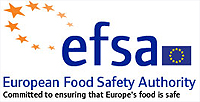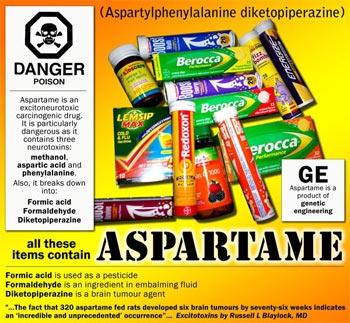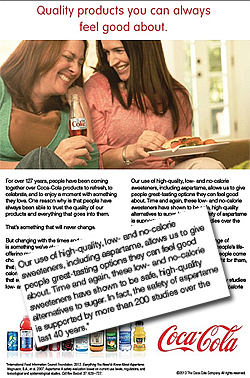 |
 |
|
As previously reported in Unionsafety, in evidence based sourced report by this website’s Editor, Chris Ingram, Aspartame (E951) has serious health risks associated with its long-term use. Last August, in the USA, Coca-Cola launched a new ad campaign to defend its use of aspartame in diet soft drinks, baby food, children’s sweets, fruit drinks, cordials and hundreds of different packaged foods; including the change of identification of the chemical additive from Aspartame to NutraSweet.
Given the billions of pounds in profits made by the company producing and supplying Aspartame across the world; it is not surprising that the EFSA and other bodies who’s sole reason for existence is to protect public health, don’t have the guts to assess the chemical used in food and drink, with impartiality and with all the facts. Worse still, even the EFSA report acknowledges that in certain circumstances, a pregnant woman drinking soft drinks containing Aspartame, runs a risk of having a baby with heart defects as a result of the production of phenylalanine produced as the Aspartame breaks down within the gastro-intestinal tract. The other products resulting from these reactions are methanol (wood alcohol) and the amino acids aspartic acid.The body breaks down the methanol into formic acid and formaldehyde (used in embalming fluid). It goes on to explain that: "Individuals homozygous for phenylalanine hydroxylase mutations (phenylketonuria (PKU) patients) have a markedly reduced capacity for phenylalanine metabolism. After birth, homozygous PKU babies show severe impairment in development and cognition if the phenylalanine intake via the diet is not strictly controlled. PKU mothers with poorly controlled phenylalanine intake in their diet during pregnancy may give birth to babies with congenital heart diseases, microcephalus and impaired neurological function. The Panel noted that adverse developmental effects were seen in children born to PKU patients and that these effects appeared to be related to maternal phenylalanine levels. Yet, they still claim Aspartame is safe - even if ingested by pregnant women unaware that they suffer from the condition phenylketonuria (PKU)? Currently drinks which contain phenylalanine have to have a declaration to that affect on the label, but not so with those drinks which result in the intake of phenylalanine caused by it being produced in the human gut as a result of the soft drink being ingested. Further, no one challenges the currently assumed daily intake level of Aspartame considered to be a safe level, against which food and drinks are tested to ensure they are within those Daily Intake levels. The amount allowed as being safe may in itself be wildly out. Also, exposure levels over several years of daily intake of Aspartame have not been taken into account. The amount of diet drinks containing the artificial sweetener consumed on a daily basis by the general population is also a guess, and does not relate factually to the amount of Aspartame assumed to be consumed, when setting the daily safe intake levels. Writing to of EFSA, and including a detailed critique of their January 2013 interim report; Professor Erik Millstone said: In his report in which he points out the bias of the EFSA panel looking into the safety concerns about Aspartame, he states: “Of the 17 members of the EFSA panel, 7 have direct commercial, 3 conflicts of interest, and another 5 have institutional conflicts of interest – for example because their employers have already announced that aspartame is safe. Only 4 panel members are not characterised by some relevant conflicts of interest.” He argues that: “EFSA should therefore discount the draft report, convene a new panel composed
only of, and supported only by, experts who are free of any conflicts of interest. The EFSA website asserts that: ‘…….EFSA’s Panel on Food Additives and Nutrient Sources added to Food (ANS) has launched an open consultation on a draft opinion on the re-evaluation of aspartame (E951). This document is the first full evaluation of aspartame that has been requested of EFSA.
Evidence that is available and directly relevant information, has not been taken into consideration and is provided by the dossier of documents that Professor Erik Millstone delivered to EFSA in July 2011, and at their request. The professor says in his letter of January 2013 to EFSA: “I responded to EFSA’s initial call, on 1 June 2011, for data on Aspartame with an annotated list of 30 documents on 26 July 2011. I selected those documents from my extensive collection of material on the aspartame saga because I judge them to be indispensable for any competent, adequate and robust assessment of the safety of aspartame. In that submission I explained that the documents comprising my dossier indicate that: 1. When aspartame was initially tested by, and for, G D Searle in the 1970s, several of the pivotal tests were incompetently conducted and misleadingly reported. Furthermore, when a senior US FDA toxicologist uncovered the problems, and they were then investigated by FDA task forces, further evidence emerged indicating that no reliance could be placed on the supposed results of those test. 2. The dossier of 30 documents reveals that in response Searle, and then NutraSweet, went to considerable lengths to conceal, or down-play the significance of, those short-comings in the testing and reporting. Those tactics have however not obliterated evidence, even though the ANS panel failed top engage with it.” He continues: “The Panel was not provided with a newly submitted dossier and based its evaluation on previous evaluations, additional literature that became available between then and the end of November 2012 and the data submitted following a public call for data. (page 3 lines 42-44)." Even though the documents comprising my dossier entail that no reliance can be placed on the results of at least 15 studies, all of which have been accepted for and reviewed by the ANS panel.” In a section of the Professor’s response to EFSA, entitled ‘Key highlights from the history of the testing and regulatory review of Aspartame’, he asserts:
Before those issues could be resolved, a further complex set of objections were raised, the most important of which concerned the fact that some scientists claimed that Searle had failed to conduct their safety tests properly, and that the laboratory work had been incompetent. The shortcomings in the testing and reporting of studies on aspartame were first uncovered by scientists from the FDA’s drugs division. Dr. Adrian Gross and his colleagues discovered, by examining carefully G D Searle’s laboratory records, that a large proportion of Searle’s experimental work was profoundly unreliable. In response to those revelations the FDA established two special Task Forces; one under the auspices of the Bureau of Drugs reviewed Searle’s safety evaluations of their pharmaceutical products, while the second under the Bureau of Foods, examined Aspartame.” You can download University of Sussex Professor Erik Millstone’s letter and report to EFSA here and from the E-Library Database using search word ‘Aspartame’ See also: EFSA report on their website here Chris Ingram’s report into Aspartame here Source: EFSA / Prof Erik Millstone / Unionsafety / Mail Online |
 This, despite their admitting that Aspartame contains substances harmful to human health and ignoring 20 reliable, independent studies which have identified serious health problems linked to Aspartame consumption!
This, despite their admitting that Aspartame contains substances harmful to human health and ignoring 20 reliable, independent studies which have identified serious health problems linked to Aspartame consumption! University of Sussex Professor Erik Millstone, who helped set up Britain’s Food Standards Agency, says EFSA ignored 20 reliable, independent studies which have identified serious health problems linked to aspartame. Those include brain and nervous system damage, premature births and cancer. Millstone also says members of the EFSA panel that decided the additive was safe all have either direct or indirect conflicts of interest.
University of Sussex Professor Erik Millstone, who helped set up Britain’s Food Standards Agency, says EFSA ignored 20 reliable, independent studies which have identified serious health problems linked to aspartame. Those include brain and nervous system damage, premature births and cancer. Millstone also says members of the EFSA panel that decided the additive was safe all have either direct or indirect conflicts of interest. The claim that all available information has been taken into considerations is seriously misleading.
The claim that all available information has been taken into considerations is seriously misleading.  “US pharmaceutical company G D Searle first filed a petition with the US FDA for
permission to market Aspartame in 1973, and the FDA initially proposed to grant
permission in 1974. Before the consequences of that decision could be implemented, however, objections were raised by independent scientists alleging that aspartame could cause mental retardation, brain lesions and neuroendocrine disorders.
“US pharmaceutical company G D Searle first filed a petition with the US FDA for
permission to market Aspartame in 1973, and the FDA initially proposed to grant
permission in 1974. Before the consequences of that decision could be implemented, however, objections were raised by independent scientists alleging that aspartame could cause mental retardation, brain lesions and neuroendocrine disorders.